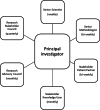Toward equity-oriented cancer care: a Strategy for Patient-Oriented Research (SPOR) protocol to promote equitable access to lung cancer screening
- PMID: 35382905
- PMCID: PMC8980795
- DOI: 10.1186/s40900-022-00344-y
Toward equity-oriented cancer care: a Strategy for Patient-Oriented Research (SPOR) protocol to promote equitable access to lung cancer screening
Abstract
Background: Screening for lung cancer with low dose CT can facilitate the detection of early-stage lung cancers that are amenable to treatment, reducing mortality related to lung cancer. Individuals are considered eligible for lung cancer screening if they meet specific high-risk criteria, such as age and smoking history. Population groups that are at highest risk of lung cancer, and therefore, the target of lung cancer screening interventions, are also the least likely to participate in lung cancer screening. This can lead to a widening of health inequities. Deliberate effort is needed to both reduce lung cancer risk (through upstream interventions that promote smoking cessation) as well as midstream interventions that promote equitable access to lung cancer screening.
Methods: This protocol paper describes an equity-informed patient-oriented research study. Our study aims to promote equitable access to lung cancer screening by partnering with patients to co-design an e-learning module for healthcare providers. The learning module will describe the social context of lung cancer risk and promote access to lung cancer screening by increasing equity at the point of care. We have applied the Generative Co-Design Framework for Healthcare Innovation and detail our study processes in three phases and six steps: Pre-design (establishing a study governance structure); Co-design (identifying research priorities, gathering and interpreting data, co-developing module content); and Post-design (pilot testing the module and developing an implementation plan).
Discussion: Patient engagement in research can promote the design and delivery of healthcare services that are accessible and acceptable to patients. This is particularly important for lung cancer screening as those at highest risk of developing lung cancer are also those who are least likely to participate in lung cancer screening. By detailing the steps of our participatory co-design journey, we are making visible the processes of our work so that they can be linked to future outcomes and related impact, and inform a wide range of patient co-led processes.
Keywords: Equity-informed patient-oriented research; Equity-oriented health care; Health equity; Health inequity; Lung cancer screening; Participatory co-design; Patient engagement; Protocol; SPOR.
Plain language summary
Lung cancer is the most commonly diagnosed cancer in Canada and is responsible for a quarter of all cancer-related deaths in the country. Screening for lung cancer using tools such as a CT scan can allow us to find lung cancers when they are still small and curable. People can receive a lung CT scan depending on how old they are and for how long they have smoked cigarettes. Certain groups of people, particularly those who have fewer resources such as time and money, and those who experience injustice because of who they are and how they look are less likely to participate in lung cancer screening. We can increase participation in lung cancer screening by educating healthcare providers on appropriate and timely ways to talk to patients about lung cancer screening. In this paper, we outline the steps of a patient-partnered study in which many different stakeholders such as patients, providers and policy-makers have come together with a goal to improve equity in access to lung cancer screening. We will do this by jointly creating an online learning module that will educate healthcare providers on how life experiences shape smoking behaviour and lung cancer risk. The module will also impart key skills on how to deliver care which is timely, appropriate and safe. Once the module is ready it will be freely available to all healthcare providers to support the fair and just delivery of lung cancer screening in the province of Ontario and elsewhere.
© 2022. The Author(s).
Conflict of interest statement
AS is supported by a Transition to Leadership Stream Postdoctoral Fellowship Award in Patient-Oriented Research from the Canadian Institutes for Health Research and is arecipient of the Engaging Multi-stakeholders for Patient Oriented research Wider Effects & Reach (EMPOWER) Award for her work on Equity-Mobilizing Partnerships in Community (EMPaCT) from the Ontario SPOR SUPPORT Unit, which is supported by CIHR and the province of Ontario. EN is an employee of the CPAC, a pan-Canadian health organization, funded by Health Canada. SH holds the Chair in Homelessness, Housing and Health at St. Michael’s Hospital and the University of Toronto. AL is supported by a New Investigator Award from the Canadian Institutes for Health Research, as Clinician Scientist by the Department of Family Medicine at the University of Toronto and as Chair of Implementation Science at the Peter Gilgan Centre for Women’s Cancers at Women’s College Hospital in partnership with the Canadian Cancer Society. AL is the Provincial Primary Care Lead for Cancer Screening at Ontario Health (Cancer Care Ontario).
Figures


References
-
- Canadian Cancer Society’s Advisory Committee on Cancer. Canadian Cancer Statistics 2019 [Internet]. 2019 [cited 2019 Sep 10]. https://www.cancer.ca:443/en/cancer-information/cancer-101/canadian-canc....
-
- Canadian Cancer Statistics Advisory Committee. Canadian Cancer Statistics: A 2020 special report on lung cancer. [Internet]. Canadian Cancer Society; 2020 [cited 2020 Nov 20]. https://www.cancer.ca/~/media/cancer.ca/CW/cancer%20information/cancer%2....
-
- Organisation for Economic Co-operation Development (OECD). Daily smokers (indicator); 2015 [Internet]. 2015 [cited 2019 Oct 22]. http://data.oecd.org/healthrisk/daily-smokers.htm.
-
- Canadian Partnership Against Cancer. The Canadian Strategy for Cancer Control: 2019–2029. 2019.
-
- Cancer Care Ontario. Ontario Lung Screening Program [Internet]. Cancer Care Ontario. 2021 [cited 2021 Aug 17]. https://www.cancercareontario.ca/en/cancer-care-ontario/programs/screeni....
Grants and funding
LinkOut - more resources
Full Text Sources

